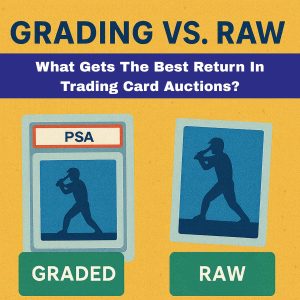One of the most common questions we hear from collectors is: Should I grade my card before selling it, or leave it raw? The answer depends on factors like card condition, rarity, and market trends. But in many cases, PSA card grading can significantly increase your return at trading card auctions.
In this guide, we’ll break down the differences between selling raw and graded cards, show you real-world value comparisons, and explain when grading pays off. We’ll also explore ROI considerations, including autograph grading, to help you make the smartest selling decision.
Raw vs. Graded: The Key Differences
Selling a card raw (ungraded) means the buyer takes your word for its condition. This often leads to lower prices due to uncertainty about authenticity or preservation. Graded cards, on the other hand, have been professionally assessed for condition and encapsulated, providing transparency and protection.
Benefits of Grading:
- Higher Buyer Confidence – A PSA slab or authenticated autograph adds credibility.

- Long-Term Preservation – Encapsulation protects against handling and environmental damage.
When Raw Might Be Better:
- The card is low-value, and grading fees would exceed potential profit.
- You’re selling in bulk lots where individual grading is impractical.
- The card’s condition is borderline, and a low grade could hurt its appeal.
Side-by-Side Auction Pricing Comparison
Below is a snapshot of recent auction data comparing raw vs. PSA-graded sales.
| Card Example | Condition / Grade | Avg. Raw Auction Price | Avg. PSA Grade Auction Price | % Increase from Grading |
| 1989 Upper Deck Ken Griffey Jr. RC | NM Raw | $50 | PSA 9: $160 | +220% |
| 1999 Pokémon 1st Ed. Holo Charizard | LP Raw | $3,500 | PSA 9: $8,200 | +134% |
| 2003 Topps Chrome LeBron James RC | NM Raw | $1,200 | PSA 10: $6,000 | +400% |
| 2020 Panini Prizm Joe Burrow Auto | NM Raw | $900 | PSA 9 / Auto 10: $1,750 | +94% |
| 1979 O-Pee-Chee Wayne Gretzky RC | EX Raw | $2,800 | PSA 8: $10,500 | +275% |
Data compiled from recent public trading card auctions and market reports. Prices may vary based on demand and specific auction house results.
When Grading Pays Off
In our experience, grading before auction is worth it when:
- The card is vintage (pre-1980) and in excellent condition.
- It’s a rookie card of a top-tier player or character.
- The card has a clean autograph worth authenticating.
- Population reports show low supply in high grades, creating scarcity premiums.
For cards with signatures, autograph grading can add substantial value, especially for limited editions or in-person signings. Buyers are more willing to bid aggressively when the autograph is PSA/DNA-certified.
ROI Considerations
While grading can multiply your return, you should factor in:
- Grading Fees – Standard PSA grading costs range from $20-$150+ depending on turnaround time and declared value.
- Turnaround Time – Plan ahead if you’re targeting specific auction dates.
- Shipping & Insurance – Always send valuable cards with full coverage and tracking.
A simple ROI formula to help decide:
(Graded Sale Price – Grading Fees – Shipping) ÷ Raw Sale Price = ROI%
Example: If a card sells raw for $200, costs $50 to grade, and sells graded for $500:
($500 – $50 – $15) ÷ $200 = 2.175 → 217.5% ROI
Selling Graded Cards for Maximum Impact
Grading is only half the battle; getting the best ROI also depends on where and how you sell. Well-established auction houses and professional card consignment services can ensure your graded cards are marketed to the right audience, featured in catalogs, and promoted to serious bidders.
Our Grading Services team can help you identify which cards are worth grading and walk you through submission best practices to maximize your auction success.
Final Word
When it comes to trading card auctions, grading isn’t always mandatory, but for the right card, it can turn a solid sale into a record-breaking one. Vintage rookies, key TCG cards, and authenticated autographs almost always perform better in a PSA slab. By running the numbers, factoring in grading costs, and partnering with trusted grading and consignment experts, you can make sure your next sale delivers the best possible return.
